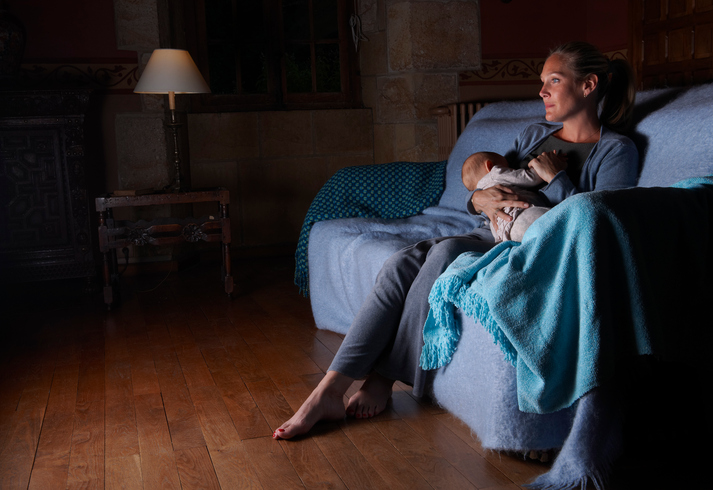‘I cried when I read it,’ a friend told me of her discovery of Susan Cain’s book, Quiet - The Power of Introverts in a World That Can’t Stop Talking. She was not alone; discovering this brilliant book was a significant moment for many introverts, who (it is estimated) make up approximately a third of the population. For most of us it meant recognition; somebody had finally named our way of experiencing the world. Identifying not only the energy sapping nature of particular types of social interaction, but celebrating what introverts bring to the table: our seriousness; our reflective qualities; our real desire to connect deeply with people, a desire often best satisfied by a smaller, rather than larger, number of friends. However, reading the book raised a further issue for me. There is discussion about how to raise introverted children, but very little exploration of being an introverted parent. What are the particular challenges and gifts that introverted parents bring to the experience of bringing up children?
QUALITIES OF AN INTROVERT
The phrase “the chaos of family life” is well-known for a reason. Family life is a privilege and a joy but it’s also boisterous, busy and loud. Is there a role for the quiet parent and what particular qualities does being introverted bring to a parenting culture where endless sociability seems to be increasingly the norm? Looking back I don’t know how I survived the lack of time to myself when my children were small. If introverts are drained by time with others and need time alone to recharge their batteries how do you ever recharge when there is always a child to attend to? Throw paid employment, household chores, extended family and friendships into the mix and what space is remaining? My extrovert husband, despite missing time alone, could cope with this, but I was living without something intrinsic to my wellbeing and sense of self.
HOW TO SURVIVE
The blunt truth is that family time is extrovert time. So if most of your time is spent with your family or combining work and family, you will be being depleted more than you being recharged. How do we introverts survive? Like many of the challenges of life with small children we find a way in the lovely imperfection of it all. If we are lucky we teach our children to love reading; this gives us peace and allows a certain smugness. If this fails we hope computer games will do the trick. Working part time or from home can be a way of regaining some space, particularly if you can get the house to yourself. But it is a tough phase, and usually only gets easier as our children get older and are seeking more space themselves. An extension of these issues, but intensified tenfold, are the challenges of the family holiday. This is because you might well be in a family room with your children, and you are under pressure to be happy all the time. This is not a good combination and in my experience can lead to certain insanity. Basic survival skills include long lone walks, empty beaches and a suitcase full of books.
MANAGING PLAYGROUNDS
The playground is also a challenging place for the introverted parent. There are a lot of expectations when you become a parent that you will enthusiastically engage in a range of social activities, from toddler groups to playground banter. If you are lucky you will develop some really good friendships, but the fact that conversations held in the company of small children are often interrupted, and playground chats are inevitably short often means this is a world where small talk prevails. Introverts aren’t great at small talk, and the expectation of sociability on mothers in the playground is particularly strong. My husband tells me that no one expects him to chat and he can happily spend the time texting on his phone. It’s part of the emotional responsibility that women tend to carry for their children. The playground is where a lot of arrangements are made, and if you opt out it feels as if you not doing the necessary duty which will facilitate your child having a happy social life. I have found it easier as my children have got older and I feel less responsible for their social lives. Although it is still rather taboo to admit you are keen for the playground ritual to end, rather than devastated by its passing.
VALUE YOUR SKILLS
On a more positive note what’s really important for the quiet parent is to value what you bring to parenting. Value your reflectiveness, your seriousness, the fact you give your family space - modelling the importance of time alone and the joy of silence. These qualities will become particularly important when parenting adolescents.
Valuing our quietness is not easy. Most of us were brought up in a pre-Susan Cain world where our introversion was at best undervalued, and at worst damagingly criticised. This sense of inadequacy led me to completely overcompensate when I first had my children, as I dragged them to numerous unnecessary playdates which were not much fun for me or for them. I now try hard to value my introverted qualities. It’s not only important for my self-esteem, it’s the best way I can communicate to my introverted daughter that in this noisy world her quietness is a personality trait to be appreciated, not a fault to be overcome.
Rhian is a mother of two daughters. She lives in Kent and lectures at the University of Kent
The Benefits of Being an Introvert
Kristen Howerton (quietrev.com) celebrates some of the ways that introversion makes her a better mother.
I STAY IN TUNE I tend to analyze everything— someone’s comment on Twitter, a weird facial expression from my husband, a friend’s text. I put as much thought into what others are saying as I do into what I’m saying. This can be exhausting for me (and overwhelming to my friends and family), but when it comes to my kids, this kind of overthinking actually helps me stay in tune with them. I’m good at reading their emotions and faces, in addition to their words.
I HELP THEM PROCESS THEIR FEELINGS I’m a processing savant. Put me in a situation, and I’ll look at it from multiple angles, think it through to its conclusion, and come to a reasonable plan of action. You know who doesn’t do that very well? A 6-yearold. If one of my kids is dealing with a tricky situation at school, no one’s better at helping them work through it than I am.
MAINTAINING ONE ON ONE CONNECTIONS I may not throw myself into the lions’ den when all four kids are playing together, but I am definitely comfortable showering each one individually with attention. One of my favorite routines is something we call a “slumber party” at our house. It’s not an actual slumber party but an intentional time when I lie in bed with one of my kids at the day’s end. We spend the time just talking. Something about the intimate bedtime setting helps us connect.
I HAVE EMPATHY My oldest daughter is a classic introvert. A couple of weeks ago, she had a playdate with four friends that lasted longer than we had planned. Around hour two of the eventually three-hour playdate, I found her in her room reading alone, with the door closed. Her friends were playing in the living room with my other kids. Everyone was having fun, so instead of forcing her into social interaction, I just let her be. This situation might drive an extrovert crazy, but I totally understand the impulse to get away.
I AM LESS LIKELY TO REACT Introverts are internal processors. For me, that means that my emotions are usually pretty well hidden under the surface. This can pose problems, but I’ve found this to be a huge benefit when it comes to discipline and children. When a kid misbehaves, I may get all rage-y inside, but outwardly I’m far less emotional, less reactive, and more logical.
I MODEL SOLITUDE We talk a lot in our house about alone time. I love to read. I love music. I want my kids to love those things too, and they do. As an introvert, I’m able to model for them the value of alone time. My kids see me reading books, practicing the piano, or otherwise entertaining myself without the need of external stimulation, TV, or a sibling. Being alone and not bored is a very valuable thing for kids to learn.
How to Protect your Energy as an Introvert
If you’ve ever felt frustrated by the demands of parenting, here’s Tarissa Helms’ (introvertedmama.com) advice on protecting your energy as an introvert
1. MAINTAIN A REGULAR BEDTIME It’s tempting to stay up late every night. The house is quiet, the kids are sleeping, and the lure of time alone is strong. But when we stay up late on a regular basis, we continually begin our days with energy deficits. By setting and maintaining regular bedtimes, we wake up rested and recharged, prepared to fully engage in the lives of our children.
2. ENJOY A QUIET START TO YOUR DAY Rather than seeking out quiet time late at night, I encourage you to get up an hour earlier and take a leisurely approach to your morning. Brew a cup of hot tea. Go for a walk. Meditate or pray. Write in a journal. Open a window and listen to the sounds of nature. Do whatever helps you feel rested, centred, and at peace.
3. FUEL YOUR BODY When my girls were toddlers, I was beyond tired. Every time I felt my energy wane, I grabbed a sugary drink or carbohydrate pickme-up. My days became an endless roller coaster of highs and lows that left me exhausted and cranky. I had difficulty sleeping at night, frequent headaches, and little patience for my children. I finally realized – there’s a better way. I decreased my caffeine and sugar consumption and started drinking more water. I now experience a more constant stream of energy.
4. SIMPLIFY YOUR FAMILY’S SCHEDULE It’s healthy for parents to have activities outside the home – volunteering in the community, getting together with friends, and pursuing our passions. However children have their own extracurricular activities too and few things deplete a parent’s energy more than an over-booked calendar. Learning to say no and set healthy boundaries with your time will save energy for the things that matter most, including your kids.
5. ASK FOR HELP You probably won’t need to look far to find people who would love to support you, given the chance. Some places to start include: Asking your partner to take the kids to the park for an afternoon. Locating a babysitting co-op in your community, so you can enjoy an evening to yourself and then return the favour.
6. TAKE REGULAR MINI-BREAKS Some of my favorite mini-breaks happen in the car. After I drop my kids off at school in the mornings, I enjoy a few minutes of silence. Other ways to take minibreaks throughout the day include: Scheduling daily quiet times for yourself and your children. Pausing midday to write in a journal. Taking a warm shower before going to bed.
7. GIVE YOURSELF GRACE More than anything, I hope you’ll remember that requiring downtime as an introverted parent is nothing to feel guilty about. Our brains are wired to need it and our bodies respond to it. Learning to embrace downtime and manage your energy is one of the best decisions you can make for your family.
More Inspiration
READ Quiet: The Power of Introverts in a World That Can’t Stop Talking by Susan Cain
WATCH Susan’s TED talk at ted.com/speakers/susan_cain







